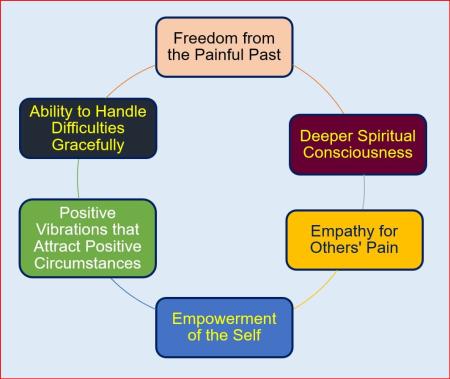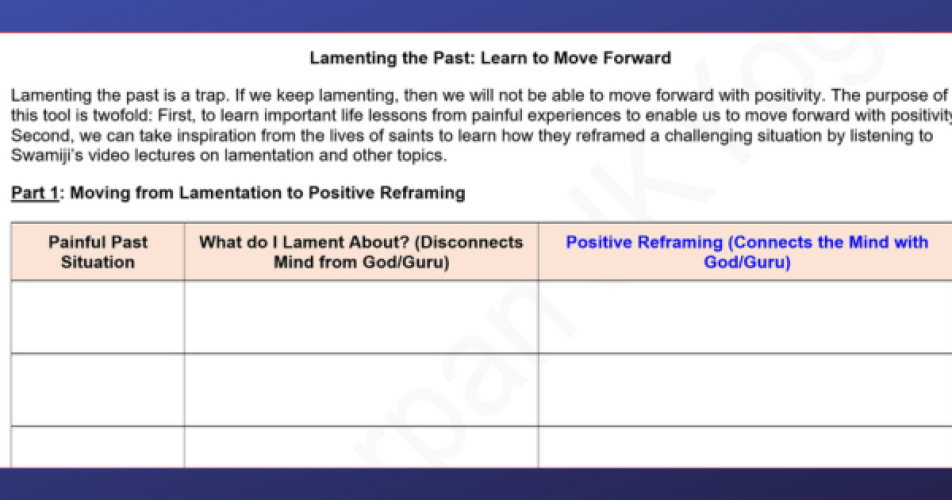
From the Editor’s Desk
Lamenting the past is a trap that many of us fall into especially if certain events may have devastated our lives or relationships. However, we have learned from Swami Mukundananda that lamentation serves no purpose. Instead, if we learn important life lessons from painful experiences, we will become capable of moving forward with increased positivity.
In this month’s Samarpan (JKYog E-Journal), we review the Vedic knowledge (i.e., tatvagyan) taught by Swamiji to understand a small piece of the vast knowledge with practical tools for application. We are immensely grateful to our Guru for teaching us this very critical life lesson to help us realize our fullest potential for maximum benefit.

Vedic Wisdom & Application
Challenge of the Month
Lamenting the Past: Learn to Move Forward
Reflection Questions
- Why do People Lament the Past?
- How can we Stop Lamenting the Past and Move Forward with Positivity?
- What Happens when we Stop Lamenting the Past?
Lamentation is an expression of grief due to painful past experiences. It could be in the form of oral and written expression, or as thoughts circling in the mind. It is usually in reference to feeling regret for broken relationships due to petty quarrels or unwarranted arguments or mourning the loss of loved ones. We know that lamenting never changes the ending of the event for which we grieve or mourn. Yet, we lament very frequently, finding some relief in reliving past experiences even if they are painful.
Why do People Lament the Past?
Lamenting the past is often due to the mind’s attachment to a hurtful memory. If pain is aversive, why do people choose to remember such events? There are a few reasons.
- Release Painful Emotions. Frequently, lamentation is about allowing oneself to experience a whole gamut of emotions – pain, anger, hurt, sadness, guilt, or shame. The release of such emotions can serve a cathartic purpose in the short term until the intellect accepts the losses and a person is ready to move forward.
- Heal the Heart. Lamentation is one way to heal the heart in the present. Those who have historically been disenfranchised lament lost opportunities or broken relationships which resulted in severe discomfort or even unforgettable pain. For example, many survivors of war crimes or communal strife experience severe trauma. In such cases, lamentation can be a coping mechanism until there is some semblance of acceptance.
- Connect with God. In some religions, lamentation is a way to come closer to God by seeking His support. By humbly expressing one’s fallibility and indicating total reliance on the grace of God alone, people lament as a way to heal from within. In such cases, lamentation turns into a useful tool for internal growth. It is said that God meets us where we are, not where we pretend to be. From a Biblical perspective, lamentation provides an opportunity for others to grieve along with us and be an integral part of our suffering and enable us to heal from past wounds.
- Reflect and Analyze. Lamentation is a way to understand the past, analyze the outcomes of challenging situations, and figure out ways to move forward. Without knowledge of the truth about oneself and others, it is impossible to reconcile with the past – people, situations, and us. Such a form of lamentation can be useful.
How can we Stop Lamenting the Past and Move Forward with Positivity?
The mind can be attached to only one thing at a time – either the hurtful events of the past or the purpose of our life which directs our present and future. Let us learn to apply some strategies taught by Swamiji to move forward with positivity.
- Reframe the Narrative. Swamiji has beautifully explained that if we have all kinds of worldly pleasures but our soul suffers a downfall, it is not good for the elevation of the soul. On the other hand, if our soul is elevated but we have lost all worldly things, we still have everything. That is the reason that instead of lamenting all the losses that the Pandavas experienced, Kunti Devi asked Shree Krishna for deprivation of worldly luxuries because the Pandavas had His support at such times.
- Perceive Adversities as Blessings. The philosophical depth in this gem of wisdom is phenomenal. We never learn or grow from comfortable situations. It is only when we make egregious mistakes, we discover our imperfections and utilize the knowledge to connect with God/Guru by perceiving adversities as blessings in disguise. As Shree Krishna told Arjun:
यो मां पश्यति सर्वत्र सर्वं च मयि पश्यति |
तस्याहं न प्रणश्यामि स च मे न प्रणश्यति || 30||
yo māṁ paśhyati sarvatra sarvaṁ cha mayi paśhyati
tasyāhaṁ na praṇaśhyāmi sa cha me na praṇaśhyati
For those who see Me everywhere and see all things in Me, I am never lost, nor are they ever lost to Me. [BG 6.30]
Swamiji beautifully explains that lamentation separates the mind from the divine realm because it takes the mind away from present contemplation of God and Guru. However, if we see a past incident in connection with God, we will think, “The Lord deliberately arranged for me to experience tribulation in the world, so that I may develop detachment. He is so concerned about my welfare that he mercifully arranges for the proper circumstances that are beneficial for my spiritual progress.”
Similar to how a caterpillar emerges from the cocoon by making the effort to secrete fluids and breakthrough the layer to transform into a beautiful butterfly, we too must make the effort to contemplate (not lament) on the past events to learn from the experience. Armed with a positive approach, we can determine to apply the knowledge and then move forward with confidence.
- Increase tolerance. Frequently, lamentation is related to insults or humiliation. When someone insults us, a better option may be to increase our tolerance. Retaliating may lead to dire consequences. Thus, tolerating the unpleasant situation and using it as an opportunity to grow from within may be the best and only option. As Booker T. Washington beautifully stated, “I shall allow no man to belittle my soul by making me hate him.”
- Develop Witness Consciousness. In The Power of Thoughts (pp. 29-35), Swamiji illuminates the importance of not accepting each negative thought that comes to the mind otherwise the tendency to ruminate over it will continue. We all need to rise above our lower nature that is built into our material mind. We are programmed to react immediately when we sense danger or discomfort, however, when we do so, the emotional discharge is usually not socially appropriate. Thus, being mindful of our emotions will enable us to observe our emotions and develop the “sakshi bhav” instead of reacting instantly. We can do this by increasing awareness of bodily sensations, awareness of the feelings and emotions that arise as a consequence, and awareness of the perception of the environment. If we recognize that perception is just that – our own perception, which could be different from the fact.
- Accept Past Mistakes. Ruminating over the past will not change anything but keep negative thoughts energized in the mind. So, we must accept past mistakes by focusing on the lessons learned and having found the wisdom to utilize the knowledge in the future. Another way to accept the past is to think of it as a reflection of our own karma. Such an approach will allow us to let go of the past, and forgive others and ourselves (see June 2021 issue of Samarpan on forgiveness).
- Distance Oneself from the Aversive Situation. Sometimes it helps to step back from the environment associated with painful experiences by taking a break. We could visit with positive associates and friends or be by ourselves to rest, reflect, and empower ourselves. Such a break may foster all the above-noted mindsets and help them translate into powerful beliefs, especially in relation to the purpose of one’s life. If our goal is spiritual in nature, remembering the purpose of life will be immensely helpful in letting go of the past and moving forward.
- Nurture Oneself. If lamentation occurs due to past trauma, it may help to acknowledge that traumatic experiences take time to heal. It may help to seek out friends from our network of support persons, seek professional help, and allow friends and close confidants to help us to recover. Revising spiritual knowledge and engaging in activities that help to divert attention to more positive and uplifting things (e.g., Satsang and seva/service) will allow us to focus on devotional sentiments.
Finally, do not lament the loss of lament!
What Happens When We Stop Lamenting the Past?
When we let go of the past, we become free from the burden of anger, resentment, and fear. We recognize that it is time to move forward, try new things to strengthen our beliefs, and aspire to live in the present. Above all, by connecting with God/Guru, we become happier, self-confident, and more productive.


Tools for Your Personal Growth
Lamenting the past is a trap. If we keep lamenting, then we will not be able to move forward with positivity. The purpose of this tool is twofold:
First, to learn important life lessons from painful experiences to enable us to move forward with positivity. Second, we can take inspiration from the lives of saints to learn how they reframed a challenging situation by listening to Swamiji’s video lectures on lamentation and other topics.
A downloadable tracking sheet is available for you to use.

Use this tool to learn important life lessons from painful experiences to enable us to move forward with positivity. We have provided a blank tracking sheet. You can keep a printed or e-copy of the blank sheet for immediate accessibility. It is meant to help us be aware of our choices and take appropriate actions. Remember, change takes time!

Love to Hear from You
- How did you apply the Vedic Wisdom?
- What challenges did you experience in the process?
Please share your comments under “Join the Discussion” below.

Gems of Wisdom from Swamiji
Here are a few YouTube video titles with related links and books where Swamiji has described the importance of moving forward in life instead of lamenting on the past.
- Negative Circumstances are Opportunities For Growth
- If you Don't Want to Continue After Failures - Watch this
- Mukundananda, S. (2022). Golden Rules for Living Your Best Life, Rupa Publications Pvt Ltd: New Delhi, India.
- Mukundananda, S. (2022). The Power of Thoughts, Penguin Random House: Gurugram, India.
- Mukundananda, S. (2022). Bhagavad Gita – The Song of God, Westland Publications: Chennai, India.



Hold Your Breath! Check out Upcoming Events
We are very excited to share a dynamite event with you that everyone is looking forward to this month!

JKYog’s West Coast Retreat
All retreats with Swamiji provide the most blissful of experiences, from divine lectures to fun-filled outdoor parikramas to yogasans, meditation, and soulful kirtans. This year, the West Coast Retreat will cover enlightening discourses on the Bhagavad Gita. As always, there will be parallel sessions for Bal-Mukund children and youth club activities. Here are the details:
- Dates: May 27 to 29, 2023
- Location: Wyndham Garden Fresno Yosemite Airport, 5090 East Clinton Way, Fresno, CA 92727
- Information Contact: (510) 364-2640 or (626) 755-4966
Do not miss the opportunity to attend JKYog’s next upcoming Spiritual Retreat and Family Camp from July 4 to 10, 2023. For more information visit: https://www.jkyog.org/events/.

Voices from the Global Community
JKYog’s e-Journal Samarpan inspires the community by introducing you to members who have been impacted by the scriptural knowledge taught and disseminated by Swamiji. Two devotees, Stephanie Sharon and Diana Thompson, describe how scriptural knowledge enabled them to let go of lamentation of past events in life and move forward with positivity. They acknowledge how Swamiji’s teachings have enhanced their spiritual practice.


We invite you to share your inspirations and success stories with us at secretary@jkyog.org.

JKYog Transforming Communities
Here, we typically share the amazing activities and news about programs conducted by various JKYog centers in the U.S.
JKYog’s Swami Mukundananda Exclusive (SMEx)
Swami Mukundananda Exclusive is truly the most heart-warming and exclusive opportunity to connect one-on-one with Swamiji. This community of spiritual aspirants is exclusive in that people sign up for membership to connect with Swamiji live, and benefit from his knowledge and guidance. In spite of Swamiji's extremely tight schedule, he so graciously takes time out to meet with all his devotees twice a month to discuss issues of great concern to people.
Some meetings are scheduled exclusively for Q&A with devotees, whereas others are on specific topics where Swamiji presents a talk followed by an opportunity for people to clarify doubts. Swamiji provides direct guidance on matters ranging from divine wisdom of the scriptures to personal challenges in life. With guidance from Swamiji, all members experience inner bliss and are very grateful for the opportunity to associate with a divine personality.
Those interested in signing up for membership can register at the SMEx website.

Glimpses of Past Events
Want a glimpse of some of our events? This month we share beautiful glimpses of Akshaya Tritiya Mahamantra Yajna with Swamiji and Ram Navami.









